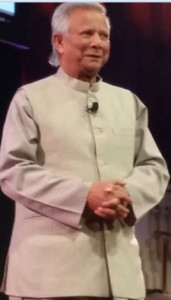
BOSTON: More than 1200 people from Worcester, Massachusetts and surrounding towns, including many students from different nearby colleges, recently gathered at the beautifully designed Mechanics Hall at the Becker College to listen to Prof Mohammed Yunus, popularly known as the Father of Microfinance. Fallon Health was the presenting sponsor of the event.
Becker College President Robert Johnson welcomed Prof. Yunus and the audience with an impressive introduction His presence in Greater Boston area marked the launch of the Yunus Social Business Centre at Becker – the first officially-sanctioned Yunus Center in the country. Prof. Yunus is a distinguished, visionary leader who has prompted positive socio-economic change on a global scale; so it is both an honor and a privilege to bring him to Worcester so our students and the public can hear first-hand about his transformational vision,” said Johnson in his address.
The Center will focus on educating, developing and deploying sustainable, scalable, and social businesses that generate resources to have socio-economic impact. Seven Hills Foundation President and CEO, David Jordan delivered the highlights of his Foundation and how it will serve as a partner for the Centre and provide Becker students and faculty with opportunities to work at Seven Hills’ project sites in Bangladesh, Ghana, Sierra Leone, Liberia, Kenya, Haiti, Guatemala, and Jamaica, to bring in positive and self-sustainable change. He also added how his Foundation was impressed by Prof. Yunus’ innovative, self-sustaining social business ideas that transformed lives and communities in Bangladesh.
Prof. Yunus in his speech on the topic observed, “We Are Not Job-Seekers, We Are Job Givers – Turning Unemployment into Entrepreneurship” by narrating his own “Microfinance” project examples.
His speech in a story telling format made all the people to listen attentively to his various microloan project stories that helped alleviate poverty among lower middle and poor classes and farmers in Bangladesh.
Prof. Yunus initiated the concept of social business, utilizing micro-finance to help the poor to develop self-sustainable businesses. He established the Grameen Bank in Bangladesh in 1983 driven by the belief that credit is a fundamental human right.
His objective was to help poor people to escape poverty by providing loans on terms suitable to them and teaching them a few sound financial principles so they could help themselves.
His personal loan to the destitute basket weavers in Bangladesh in the mid-70s gave rise to the idea of establishing Grameen Banks in rural areas of Bangladesh that sparked the world movement toward eradicating poverty through micro-lending. That is why he is called the “Banker to the Poor.” Replicas of the Grameen Bank model operate in more than 100 countries worldwide.
His dedicated work in the area of sustainable economic development has been recognized with more than 100 awards from 26 countries, including the Nobel Peace Prize, the U.S. Presidential Medal of Freedom, and the U.S. Congressional Gold Medal. In 2012, Fortune magazine named him one of the 12 greatest entrepreneurs of all time. Beside his glorious recognition, he faced some allegations and criticism but remains highly respected as a forward thinker on breaking the cycle of poverty.
The audience enjoyed his very inspiring speech and applauded with claps the successes in his long journey and laughed at the incidents which he narrated with a touch of humor. His motivational speech made the audience pay him standing ovation. At the end, Johnson offered him the Becker Presidential Medal in the middle of another standing ovation and big round of applause.
Geetha Patil






